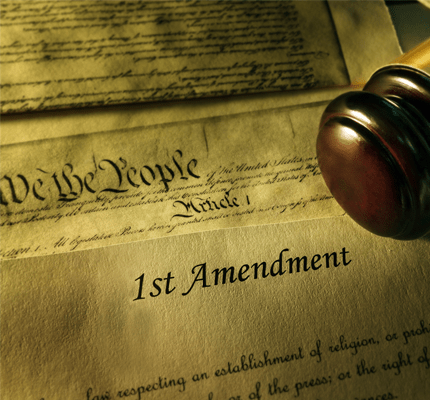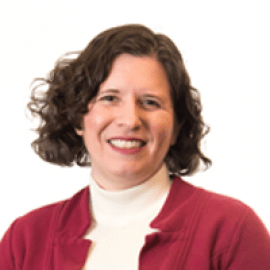
How Do Private Universities Affirm Free Speech?
Free speech has been a central issue on many university campuses in recent years. Yet, the focus is often on public universities because students at private universities may not receive the same free speech protections as their public university counterparts. Although there is no requirement for them to do so, some private universities have developed policies that support free speech on campus in line with their public counterparts. In a new article published in NCA’s First Amendment Studies, Erica R. Salkin and Colin Messke explore how private colleges and universities use public documents and statements to affirm freedom of expression on campus.
Private Colleges and Universities
According to Salkin and Messke, most of the laws regarding free speech on university campuses do not apply to private universities. Although some students at private universities may receive federal aid, the authors note that the aid is distributed to the student, not to the university, so this does not change the university into a public institution or a state actor. However, they also note that private universities that receive federal funding through students have been required to comply with the Civil Rights Act of 1964, the Fourteenth Amendment, and other federal laws. Salkin and Messke also note that in the future, institutions may be required to protect free speech if they receive federal funds.
Free Speech Statements
Salkin and Messke looked at 190 private universities and examined whether the schools had documents articulating protection of free expression. They focused only on statements that affirmed free speech, rather than tracking statements that prohibited certain speech. Salkin and Messke identified 75 statements, many of which had been created in the past seven years. They analyzed the statements and identified four themes: free speech as an educational good, responsibility for the university environment, speech and conflict, and alignment with public institutions and the U.S. Constitution.
Free Speech as an Educational Good
Nearly half (31) of the statements linked free speech to the school’s pedagogical mission. Most of these institutions were secular institutions that were not affiliated with a religious tradition. For example, free speech was described as “vital” and “essential” in some statements: “[the university] considers freedom of inquiry and discussion essential to a student’s educational development. Thus the University recognizes the value of all students and employees engaging in discussion exchanging thought and opinion; and speaking, writing, or printing freely on any subject.” Salkin and Messke contend that statements such as this go beyond the requirements of the First Amendment to argue that free speech is critical for education.
Responsibility for the University Environment
About two-thirds of the private schools in the sample were small, residential institutions. Salkin and Messke argue that the schools’ small sizes are reflected in the statements that emphasized students’ responsibilities to their campus community: “We have obligations to protect the dignity and security of all members of the College community from those who would seek to use speech primarily to deprive others of their freedom to learn, their freedom to contribute, and their freedom to participate in our community.” Similar sentiments were echoed in more than half of the statements examined. However, the universities were also careful to emphasize that these statements did not protect students from language that they may find disagreeable or offensive, except for harassing or threatening speech, which was generally prohibited.
Speech and Conflict
Salkin and Messke observed that some statements referred to speech in terms of collaborative processes (debate, discourse, discussion, dialogue), while others referred to speech as divisive (dissent, disagree, disrupt). They identified 38 statements that focused on collaborative verbs. These statements emphasized that students bring different perspectives to the institution. For example: “Students and student organizations may examine, discuss, and debate any topics of interest to them within the framework of academic inquiry.” Salkin and Messke argue that these statements emphasized fostering an exchange of ideas.
In contrast, some statements addressed divisive language. For example: “The University recognizes that the free exchange of ideas and expression may produce conflict. This exchange is an important element in the pursuit of knowledge and a necessary part of the Catholic Intellectual Tradition (CIT). Implicit in the pursuit of this exchange is the privilege to dissent.” According to Salkin and Messke, these statements emphasized the importance of free speech, even when it may lead to uncomfortable outcomes. Finally, a minority (14) of statements addressed both divisive and collaborative uses of speech, usually to show that divisive speech is best responded to with respectful speech.
Alignment with Public Institutions and the U.S. Constitution
Salkin and Messke found that some of the institutions included statements that alluded to the U.S. Constitution or federal or state law. These statements sometimes referenced U.S. Supreme Court cases directly, including the landmark Tinker v. Des Moines case. In Tinker, the court determined that public schools could not interfere with student speech, unless it was disruptive in the classroom or conflicted with the rights of other students. Salkin and Messke argue that the influence of Tinker can be found in statements that allow regulation “to prevent unreasonable interference with or disturbing of the University’s educational, teaching, research, outreach, and business function.”
Conclusion
Salkin and Messke conclude that this study demonstrates that some private institutions have affirmed students’ free speech rights and that many support free speech principles through policy statements even when the policies may lead to conflict or uncomfortable discussion. They also note that the statements they identified can help other private universities craft their own free speech statements.



